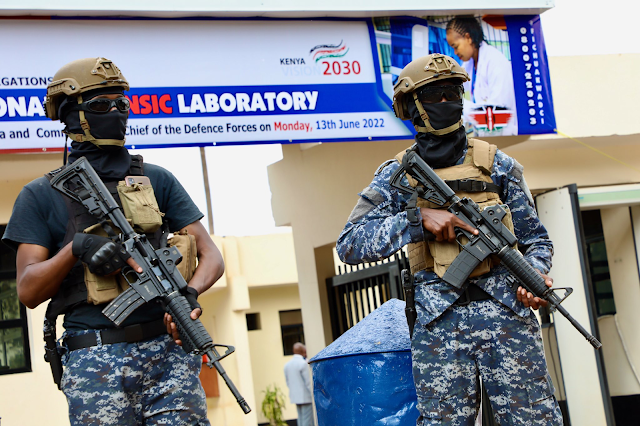Search This Blog
"Truth comes only to conquer those who have lost the art of receiving it as a friend." ~ Ravi Thakur
Featured
- Get link
- X
- Other Apps
Are Kenya Police Battle and Process Ready for the Haiti Mission? Understanding Kenya's Involvement in Haiti
Kenya's decision to deploy its police force to Haiti has raised eyebrows and prompted questions about the rationale behind such a move. As the United States, with its formidable military capabilities—the most powerful military machine in the history of mankind—refrains from taking up the assignment, attention is turning to why a nation like Kenya, with limited resources and a relatively modest military budget, has been tasked with such a significant mission. What are the complexities surrounding Kenya's involvement in the Haiti mission? What are the reasons behind it? Are there any potential challenges? What are the implications for both Kenya and Haiti?
Kenya Police's preparedness for the Haiti mission remains a subject of scrutiny. While Kenya has committed to the mission, questions linger regarding the adequacy of training, equipment, and battle readiness. Despite these concerns, Kenya's willingness to participate suggests a level of confidence in its capabilities to contribute positively to the mission.
US Refusal and Hidden Dynamics
The United States, despite its status as a global superpower with unparalleled military prowess, has declined to lead the mission in Haiti. This decision has fuelled speculation about underlying motives and hidden dynamics at play. While the exact reasons for the US refusal remain undisclosed, it underscores the complexity of international relations and the intricate dynamics shaping global security initiatives.
Kenya's Role and Cultural Understanding
Kenya's engagement in Haiti raises questions about its cultural understanding and language skills necessary for effective interaction with the Haitian population. While Kenya may lack direct cultural familiarity with Haiti, its experience in peacekeeping missions across Africa provides a foundation for cross-cultural engagement. However, the unique context of Haiti warrants a tailored approach to ensure meaningful interaction and collaboration with local communities.
Concerns about Human Rights and Misconduct
Amid Kenya's deployment to Haiti, concerns arise regarding potential human rights abuses or misconduct by Kenyan forces. The history of peacekeeping missions worldwide highlights the importance of upholding human rights standards and fostering accountability among deployed personnel. It is imperative for Kenya to prioritise adherence to international norms and regulations to mitigate such risks and uphold its reputation on the global stage.
Impact on Domestic Security and Stability
Kenya's involvement in the Haiti mission raises considerations about its impact on domestic security and stability. While the deployment may strain resources and divert attention from internal challenges, it also offers opportunities for skill development, international cooperation, and diplomatic engagement. Balancing these factors is crucial to ensure that Kenya's participation serves its national interests while contributing meaningfully to the broader mission objectives.
Accountability and Transparency Measures
To address concerns surrounding accountability and transparency, Kenya must implement robust mechanisms for oversight and reporting throughout the mission duration. This includes regular assessments of conduct, adherence to rules of engagement, and transparent communication with the public and relevant stakeholders. By prioritising accountability, Kenya can demonstrate its commitment to upholding ethical standards and fostering trust in its participation in international missions.
Kenya's decision to deploy its police force to Haiti reflects the complexities of international security dynamics and the evolving landscape of peacekeeping efforts. While questions persist about Kenya's readiness and the rationale behind the US refusal, it is essential to approach the issue with a nuanced understanding of the various factors at play. By addressing concerns related to cultural understanding, human rights, and domestic implications, Kenya can navigate its involvement in the Haiti mission effectively, contributing to global stability while safeguarding its national interests.
- Get link
- X
- Other Apps
Popular Posts

The One On Why Uganda Produces Shitty Ads
- Get link
- X
- Other Apps

Of Australian Bogans Masquerading As Creatives In Nairobi Agencies
- Get link
- X
- Other Apps




Comments
Post a Comment